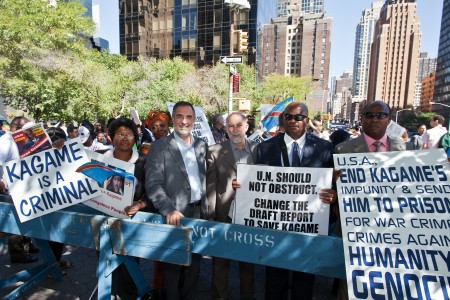Posts from — September 2010
Rwanda�s Paul Kagame: A President in Crisis
by Carroll Bogert
When Rwanda’s President Paul Kagame joins the other heads of state for the UN General Assembly this week, there’ll be awkward questions to answer about alleged atrocities
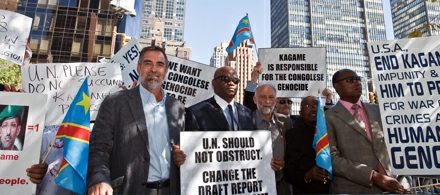
Among the heads of state who gather for the United Nations General Assembly every September, the President of Rwanda Paul Kagame has always glittered a little brighter, appearing to have more friends and admirers in New York than any other head of state from a tiny African country.
This week, however, Kagame may be getting a more chilly reception when he arrives in New York. A draft United Nations report, recently leaked to Le Monde and the New York Times, has documented gross atrocities committed by Rwandan government troops in the neighboring Democratic Republic of Congo.
Kagame has denounced the report as fabrications from the very institution that stood aside and let the Rwandan genocide happen back in 1994. He’s also threatening to pull Rwandan peacekeepers, among the best-trained in Africa, out of Darfur. The UN Secretary-General paid an emergency visit to Kigali to try to repair the damage, and has delayed formal publication of the report until October 1, when the General Assembly will be safely over and done with.
But that won’t stop Kagame from having to face awkward questions while he’s in town. The UN report accuses the Rwandan army of systematically murdering tens of thousands of Hutu civilians in Congo following its invasion of Congo in 1996.
Meanwhile, back in Rwanda, tens of thousands of civilians are estimated to have been murdered by Kagame’s Rwandan Patriotic Front in its march to power in 1994. Kagame’s government has thwarted any attempt by the International Criminal Tribunal for Rwanda, set up by the UN Security Council to prosecute the crimes of 1994, to prosecute officials of the RPF.
Then there’s the steady crushing of political dissent. The New York Times has doggedly reported on the lopsided election in August 2010 that gave Kagame 93 percent of the vote; the exclusion of opposition parties from the race; the shooting of a Rwandan general who has broken with Kagame in broad daylight in South Africa; the fatal shooting of an independent journalist reporting on the South African incident; the grisly murder of an opposition politician; the closure of two opposition newspapers.
Kagame supporters have dismissed the UN report as unscientific. As Steve Terrill wrote on the Paul Kagame Fan Club website: “They required only two sources for each event cited in the report, regardless of the gravity of the incident. That’s the same requirement a local newspaper reporter has and is a far cry from the rules of evidence born by prosecutors and criminal investigators.”
In the past, his audiences with the editorial boards of the New York Times and the Wall Street Journal have brought him praise as a visionary, a man who brought economic rationality to Africa, and of course most of all, the man who stopped the genocide in Rwanda.
And some of the world’s most admired figures have been his most ardent admirers for years. Bill Clinton has called Kagame “one of the greatest leaders of our time” who “freed the hearts and minds of his people to think about the future,” and bestowed his Global Citizen award on the Rwandan president last year. Tony Blair, who acts as an advisor to Kagame, recently praised the “visionary leadership” of “my good friend Paul Kagame,” while his former UK development minister, Clare Short, reportedly referred to Kagame as “such a sweetie.”
Meanwhile, American conservatives are also very fond of Kagame because he’s an up-by-the-bootstraps leader who promotes business and investment. As an admiring profile in the Wall Street Journal put it earlier this year, “The man who ended Rwanda’s genocide doesn’t want foreign aid. He wants investment and free trade.” Music to free market ears!
Philip Gourevitch has been one of America’s leading commentators on Rwanda since the publication of his 1998 book, “We Wish to Inform You That Tomorrow We Will Be Killed With Our Families: Stories from Rwanda.” The book helped spur an entire generation’s sympathetic concern for violence in Africa, and gave an important, and explicit, modern thrust to the shopworn phrase, “Never again.” He, too, has referred to Kagame in glowing terms, comparing him to Abraham Lincoln, “another famously tall and skinny civil warrior.” In a recent blog post on the UN report for The New Yorker, Gourevitch called the genocide accusation “sensational” and alleged that the standard of evidence used by UN investigators was “beyond minimalist.”
Perhaps the most vivid example of Kagame’s apotheosis is “Earth Made of Glass,” a documentary on the Rwandan genocide that received its premiere this year at the Tribeca Film Festival. Kagame himself flew in for the event, and with good reason: the film unswervingly portrays him as a savior and a visionary. Not a whisper of his deteriorating human rights record. Lurking behind all this hyperbolic praise is raw and bitter guilt. The US and the UK, like other governments, failed to intervene in the 1994 Rwandan genocide. Both Clinton and Blair later emerged as moralists and humanitarian interventionists who claimed human rights as one of the guiding principles for American and British leadership in the world.
The 1994 genocide in Rwanda was unique in its horror and its scale. It cannot be equated with the horrendous crimes of the Rwandan army in Congo in the following years, but neither can it be used to justify or obscure them. If Clinton, Blair and other global leaders continue to ignore the darker side of Kagame’s story, they will only compound the problem. Burying the truth about horrific crimes is a very effective way to sow the seeds for future grievances and more violence.
Carroll Bogert is the Deputy Executive Director for External Relations at Human Rights Watch.
[Published in:
The Daily Beast ]
September 23, 2010 2 Comments
UK government defiant despite a slump in the sales of �Rwanda made in London�
If there is anything positive about the presidential elections in Rwanda in August 2010 it will have been to cut down on the makeup that made the Rwandan regime a darling of the West and to allow part of the world to see the true image Rwanda. Some commentators have described the process of change as �cracks in the mirror�. However the UK government seems to live in denial of the new image that is reducing the sale of �Rwanda made in London� and allowing the emergence of the image of �Rwanda made in Rwanda�.
The atmosphere before elections showed a case study par excellence of an absence of the minimum conditions for free and fair elections. The government suspended two popular independent newspapers, Umuseso and Umuvugizi, described by the New York-based Committee to Protect Journalists as ‘the only critical media voices left in the country’. Jean-L�onard Rugambage, a journalist working for the banned newspaper Umuvugizi was gunned down; his colleague who had fled to Uganda survived kidnapping thanks to a swift intervention of Ugandan security services.
Mrs Victoire Ingabire, chair of the opposition United Democratic Forces, was arrested and charged with denying the genocide, bailed but kept under house arrest. Her American lawyer, Professor Peter Erlinder, was arrested too, also accused of genocide denial, and only released after an outcry from international legal professions including the UK Bar Council.
A second presidential hopeful, Bernard Ntaganda, was put in prison before elections on four charges, including terrorism.
The Vice President of the Green Party was murdered in dubious circumstances.
A former close ally of Kagame, General Kayumba Nyamwasa, who fled Rwanda earlier in the year afraid for his life, survived an assassination attempt allegedly commandeered by the Rwandan Government. The incident has soured relations between South Africa and Rwanda. This happened when the World cup was in full swing in South Africa and it is suggested that the plotters believed that security forces would be busy with the world cup security to have time for individual cases. This attempt followed the refusal of the South African Government to hand him over to the Rwandan government.
A Human Rights Watch researcher was expelled from the country over alleged visa irregularities. However it was an open secret that the regime was wary of the criticism of HRW over democratic governance and human rights situation in Rwanda.
Despite all these troubling incidents the UK government through its Minister for Foreign and Commonwealth affairs Henry Bellingham welcomed the success of President Paul Kagame with an unequivocal warm message which read in part as following:
�As a friend of Rwanda and a fellow Commonwealth member we welcome the peaceful and credibly administered Presidential Elections on 9 August. Rwanda has made huge strides since 1994 and these elections represent another important stage in the country�s development�. In other words: carry on it is alright!!!!!
This was in stark contrast with the US statement that read as follows: �Democracy is about more than holding elections,� �A democracy reflects the will of the people, where minority voices are heard and respected, where opposition candidates run on the issues without threat or intimidation, where freedom of expression and freedom of the press are protected.�.
It was also in real defiance of the fundamental issues raised in the Wall Street Journal �challenging the unconditional support given to the Rwandan regime in the following words �should we �( the west) be rushing to canonise Kagame and his cronies in Kigali� adding that the events leading to elections ���paint a picture of a repressive regime that has played on the conscience of the world to silence dissent, crush critics and devastate its neighbour in a conflict that has left more people dead than any war since the Second World War�.
9 months before the elections ( December 2009) �the Commonwealth Human Rights Initiative had written a report in which it warned that Rwanda’s constitution was “a facade which hides the exclusionary and repressive nature of the regime”, that “basic human rights are in an unsatisfactory state“, “censorship is prevalent” and that there are “serious concerns about the level of political freedom”.
The two contrasting positions reflect two Rwandas: Rwanda made in London� under the able management of the British Public Relations Firm Racepoint and �Rwanda made in Rwanda�, lived by the overwhelming majority of Rwandans.
Rwanda made in London
The Rwanda made in London is based on very simplistic view of the complex history of Rwanda. It is premised on the existence of the good and the evil, the good guys the RPF government led by General Kagame who singlehandedly stopped genocide of the Tutsi and is their �protector against the bad guys, Hutu barbarians who carried out genocide and are planning to kill Tutsi survivors, reason why Kagame must stay to keep them at bay.
Kagame is praised for his skill in national reconciliation after the terrible genocide, his determination to make Rwanda the first middle-income country in Africa, with impressive economic growth rates, improved public services, absence of corruption and a good environment for business. Rwanda is also highly rated for having more women in parliament than any other country in the world. The sale of this image has done very well for almost two decades now.
Cathy Pittman, Managing Director (Europe) of the British PR firm Racepoint, hired by Paul Kagame to make over the image of Rwanda is quoted in the Guardian Newspaper saying �Now we are feeding content and stories to journalists about the economy and culture. A lot of it is about images.”
The latter firm has done so well in the makeover of Rwanda that it has gained more business from other governments that face criticisms for human rights violations.
However people are starting to look more critically below the makeup and to discover the true colour of the genuine Rwanda, �Rwanda made in Rwanda� and this trend is seriously threatening the sales of �Rwanda made in London�.
Rwanda made in Rwanda
The Rwanda made in Rwanda is marked by a totalitarian system of government, a repressive system and growing economic disparities that are creating frustrations and disenchantment among the population. The following is a modest attempt to show some of the colours of �Rwandan made in Rwanda�.
Rwanda as a hotbed of instability in the Great lakes region
The fundamental issue that eludes many analysts �about the current situation in the Great Lakes Region is that rebel invasion of Rwanda by the group led by Kagame on the 1st of October 1990, has set in motion events that led to loss of lives of biblical proportions.
Yoletta Nyange, writing for the Guardian newspaper in August this year put the following fundamental question: �Certainly there have been benefits to Kagame’s rule in Rwanda, but what has it cost us? Is the price equal to the good that he has done in Rwanda?
General Paul Kagame came to power by the barrel of the gun. By invading Rwanda, though it was led by a dictatorship, the country was peaceful and technically the invasion could be viewed as a crime against peace, especially that the grievance that the Rwandan government had refused to let refugees back home had been superseded by a bilateral agreement between Rwanda and Uganda 3 months before the invasion, with the support of the United Nations High Commission for Refugees, for a peaceful return of refugees from Uganda.
Starting with the invasion and its spill over in the Democratic Republic of the Congo, it is estimated that nearly 6 million people died as a consequence of invasions of the Congo and funding proxy wars. This is the highest loss of human life in conflict since the 2nd world war. This figure does not take into account the number of women raped, millions of children whose future has been ruined by the wars, thousands who are in exile or are living as internally displaced.
A recent UN report leaked by the press provides evidence that the Rwandan Army, under Kagame as commander in chief were directly and inextricably implicated, not only in fuelling that conflict in Eastern Congo, but in possibly carrying out the most serious crime in international human rights and humanitarian law � genocide.
The Rwandan regime facilitated the plunder of a neighbouring country as it came out in the UN report 2003 on the looting of the natural resources of the Democratic Republic of the Congo. The crumbs handed down by the multinationals are the ones funding the booming building industry that the World Bank deliberately uses to show Rwanda as a success story of World Bank liberalisation programme.
Corruption has been monopolised like political power
While it is indeed true that Paul Kagame has exercised zero tolerance for corruption, the law applies to those who are not close to him, have lost favour or constitute a threat to his power. By doing so he kills two birds with one stone: he pleases his sponsors and then gets rid of potential threats to his power.
Below is the example he has set.
Here is one of a pair of jets that President Kagame is alleged to possess.
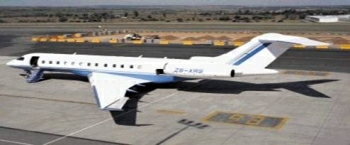
The pair of Bombardier Global Express BD-700 jets – with a new price tag of $50-million each – was acquired in 2003 and 2008, respectively. Both are available for charter when not needed by the Rwandan government.
Aviation experts say the XRS is capable of flying “halfway around the world without refueling”. It is one of the biggest business-class jets available. �Paul Kagame uses it often to go to visit his son who is studying in the US.
Kagame controls the finances of the RPF party which is now reputed to be the richest organization in East and Central Africa. It has invested money in banking, mining, and import and export business. He is accountable to no one. His wife is alleged to control the production and export of flowers. Farming areas for food production have been turned into flower farmland.
Kagame and his rebel army did not singlehandedly stop genocide
There is now evidence to show that Paul Kagame ordered the shooting down of the plane of late President Habyarimana, an incident that is largely considered to have triggered the massacres that degenerated into genocide. The evidence is contained in a 7 year investigation report by a world renowned anti terrorist judge Bruguiere and an investigation carried out by a Spanish lawyer on behalf of families whose relatives were murdered in Rwanda.
Besides, after the shooting down of the presidential aircraft and the outbreak of massacres of Tutsi, the RPF rejected calls by the Rwandan government forces for a meeting on the 8th of April 1994 to discuss how to manage the situation after the incident. The RPF again sabotaged a meeting organised by the UN representative Jacques Bobooh between the RPF and government Forces on the 15th of April 1994, to agree on a ceasefire so that the army could take on the work of stopping massacres. RPF gave impossible preconditions including the demand to denounce the new civilian interim government and the President.
The RPF wrote to the Security Council on the 30th April 1994 while it was discussing military intervention warning that any military intervention would be resisted militarily. According to Human Rights Watch there were still thousands of Tutsi alive and who were calling for rescue. According to General Dallaire, commander of the UN military forces, Kagame told him that the death of those innocent people were collateral damage to his war plan.
False claims of better standards of life under the RPF government
While it is indeed true that some development has taken place in Rwandan since 1994, people often forget to ask the issue of benchmarking to measure success or the opportunity cost. Rwanda does not start in 1994. It would be more appropriate to go a little bit further down before 1994.
Why not imagine a situation where the RPF had not triggered off the chaos in the region by its invasion of a peaceful country, had not destroyed infrastructure, displaced more than a million people from the most fertile area as part of the country as part of its war strategy, had not created conditions that facilitated genocide, had not caused so much of Rwandan intelligentia death or exodus.If Rwanda had received the money that the International community has been pumping into Rwanda since 1994 without having to fund the military hardware that destroyed the human and physical resources that existed already financed by Rwandan the taxpayer and the International community. The World Bank is using the same sweet words it used under the previous regime. In its report 1989 before the invasion Rwanda was praised to be one of best managed country in Africa, with the least economic disparities between the rural and urban areas, with the best road network and better supply of drinking water. Rwanda was doing better economically than any other neighbouring country.
There is no economic miracle in Rwanda. The UNDP Human Development Index Report which is jointly published with government as a blueprint �Turning Vision 2020 Vision Into Reality� observes that �Rwanda�s high growth rates are deceptive in that they hide large and growing inequalities between social classes, geographic regions and gender�.
- though the Rwandan economy depends mainly on agriculture, which supports 80% of the workforce and produces 42% of the GDP, the agricultural sector receives a mere 3% of the national budget, a far cry from the 10% threshold recommended by the United Nations Food and Agriculture Organization (FAO)
- In 2003, the agricultural sector sustaining the majority of the poor received only 2% of total bank credits, of which 8% amounted to less than US$ 25
- In rural areas, 30% of children drop out of school before the end of 4th grade, likewise, high school enrolment stands at a 7.9% in rural areas, compared with 10% nationwide
- Military and security forces � same as with the FARG (fund for the survivors of genocide) receive 10% of development funding, almost twice the share for agriculture, UNDP (2008),
- 83% of the medical personnel work in cities and only 17% in the poor, rural areas.
- All the rural feeder roads are now nonexistent or inaccessible due to lack of maintenance so the sick are taken to hospital carried shoulder high on improvised stretchers.
- Rwanda�s Gini coefficient, measuring economic inequality, has almost doubled in the last 20 years, placing Rwanda among the top 15% most unequal countries in the world.
Farmers are forced to grow crops imposed by the government and sell them to get money to buy the food they need. This is exactly the colonial policy that caused famine in Africa forcing people to �produce what they do not consume and consume what they do not produce�. According to official statistics despite the increase in population by 4 million, food production has not yet reached pre-war levels.
The cost of making the capital clean for tourists and foreign visitors
Kigali is credited for being a clean city where there are no beggars, no people without shoes, no use of plastic bags. �No other African city can boast of that cleanliness, it is claimed.
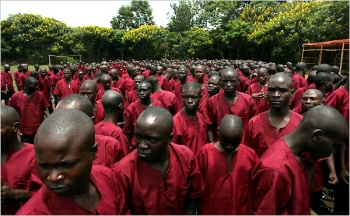
The cleanliness has meant that:
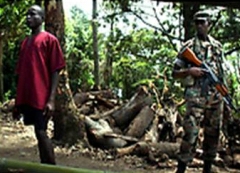
Of course! �Rwandans are as free and happy as they have ever been� (President Kagame, April 2010)
�Nearly 900 beggars, homeless people and suspected petty thieves, including dozens of children, have recently been rounded up from the nation�s neatly swept streets and sent � without trial or a court appearance � to this little-known outpost�
See: Iwawa, the Island of Shame in Rwanda and Rwanda: children held on Iwawa Island Prison camp are crying out for someone to help
Rwanda can boast like super powers that it has the third highest incarceration rate in the world, behind the United States and Russia.
The greatest number of women in Parliament
Real empowerment depends on the influence you have over decisions. The presence of women in parliament seems to be a mere ploy to attract world sympathy.
Despite the fact that women are the majority in Parliament, maternity leave has been reduced from 12 weeks to six weeks. A mother will be entitled to six weeks of leave earning 100 per cent of her salary, and if she feels the need to continue the leave for six more weeks, she will be paid only 20 per cent of her salary. Given the poverty prevailing in Rwanda, who will be able to stay home, buy food, pay bills while being paid 20% of her salary?
Besides, the law gives a mother one hour a day for breastfeeding. Given the meagre salaries and the cost of transport, only mothers with private cars and able to live within the city will be able to rush home to breastfeed. Yet Rwanda is claimed as the champion of women empowerment.
Conclusion
It is hard to believe that government with an embassy in Rwanda could praise Rwandan elections as �important stage in the country�s development�, while knowing well that the root cause of the cycle of political violence has been lack of a peaceful, democratic and transparent competition for political power. Of course it is up to Rwandans to mind their own business.
Though the UK government is still defiant to continue supporting a repressive regime accused of fuelling conflict in Eastern Congo which cost 6 million lives and possibly carrying out the most serious crime in international human rights and humanitarian law � genocide, one should thank the big buyers, the Economist, the Guardian Newspaper, the Independent, the Wall Street Journal, the Christian Science Monitor, The World Today etc.. to have started looking critically at the GM product �Rwanda made in London� offered by the British PR firm Racepoint and going for an organic product �Rwanda made in Rwanda�. Having said that, let us see how true the Rwandan saying that �truth passes through fire without burning� will be�. The big buyers are offering real hope.
September 23, 2010 No Comments
South Africa govt. confirms they reception of Spain’s request to extradite ex-Rwanda General Kayumba Nyamwasa
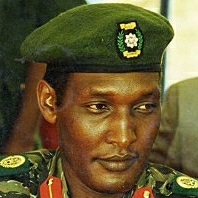
Johannesburg – A justice department spokesman says South Africa has received an extradition request from Spain for a Rwandan general already at the center of tensions between the two African countries.
Spokesman Tlali Tlali said Wednesday that he would not comment on how the South African government would respond to the request or when it was received by the government.
Spain’s cabinet on Friday said it was asking South Africa to extradite former army Gen. so that he can be tried for genocide and killing Spanish aid workers, charges Rwandan authorities have denied.
Spanish legal doctrine allows Spanish courts to prosecute egregious human rights crimes even if they are alleged to have occurred in other countries, so long as there is a clear link to Spain.
[AP]
September 22, 2010 No Comments
Clinton is reluctant to criticize genocide suspect Kagame
by Dana Goldstein.

21 Sept. – Clinton is taking a break from campaigning for struggling Democrats this week to preside over the Clinton Global Initiative, his fifth annual conference for the world�s political, philanthropic, business, and entertainment elite. CGI has changed the concept of power networking for public good: Potential donors fill the audience, listening to success stories featuring humanitarians and social entrepreneurs working around the globe. If an individual or company is inspired to give money, they publicly �commit� during or after the event.
At last year�s CGI, Clinton presented Rwandan President Paul Kagame with the Clinton Foundation�s Global Citizens Award.
This year, Kagame is accused of rigging his nation�s presidential election, and the U.N. reports that his army has been involved in human rights violations and systematic mass killings – amounting to genocide – of ethnic Hutus in Rwanda�s neighbor, the Democratic Republic of Congo.
But Clinton is reluctant to criticize Kagame, whom he credits with ending Rwanda�s devastating anti-Tutsi genocide and helping the nation heal. �It�s the best-run country in Africa,� Clinton said, adding that Kagame disputes the United Nations’ allegations against Rwanda. Clinton said he hoped Kagame would eventually �create space for dissent and accountability. But right now I�m not going to pre-judge him, because there�s a huge debate about what happened in the Congo and why. I just don�t know.�
in [The Daily Beast]
September 22, 2010 4 Comments
Victoire Ingabire on Kagame and RPF killings
Here an interview of Victoire Ingabire, leader of FDU-Inkingi opposition party, before a month before the UN report on Congo genocide:
[wpaudio url=”http://www.thepriceofuranium.com/images/mp3s/victoirecongothe100days.mp3″ text=”Interview Victoire Ingabire on RPF Killings” dl=”0″]
September 22, 2010 No Comments
Campaigners against genocidaire Kagame in New York – Sept. 20
September 22, 2010 No Comments
Long-standing U.S./U.N. cover-up of Kagame�s genocide in Rwanda and Congo
by Juan Carrero.
Join the End impunity in Rwanda campaign.
A long-standing code of silence inside the U.N. is coming to an end regarding what is probably the largest genocide ever since the U.N. founding: the genocide committed by the Rwandan Patriotic Front since 1990
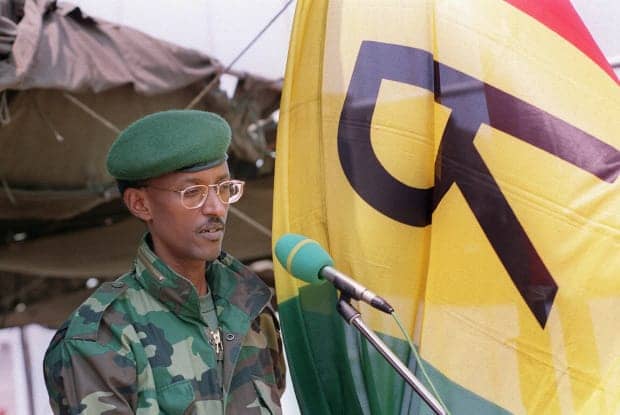
On Aug. 27, the French daily Le Monde leaked the news that a long report by U.N. High Commissioner for Human Rights Navanethem Pillay of South Africa calls the �systematic, methodical and pre-meditated crimes perpetrated against the Hutu� by the RPF (Rwandan Patriotic Front) in Zaire in 1996-1997 �crimes against humanity, war crimes, and even genocide crimes.� The report has not yet been officially released but is already circulating freely.
The victims were �mostly children, women, the elderly and the sick.� The investigation looks at the crimes perpetrated in Zaire/Congo throughout the decade 1993-2003. Rwanda is not the only country incriminated. But, according to Le Monde�s Jean-Philippe R�my, the RPF�s systematic extermination of Rwandan Hutu refugees and other Congolese Hutu � either by violent force or by systematically blocking food supplies sent especially to them � could be considered �the crux of the report.� At any rate, it is clear this extensive report is �devastating, especially for Rwanda,� as Christophe Ch�telot, in turn, points out in the excellent cover article.
Nevertheless, both articles end by reaching the same major erroneous conclusion stated by most of the press articles that have appeared since the report was leaked: the need, they say, to establish a tribunal with jurisdictional authority over these crimes. Not only does such a court already exist but, on Feb. 6, 2008, it already issued arrest warrants against 40 RPF top officials who are allegedly responsible for the crimes in Congo referred to in the new U.N. report.
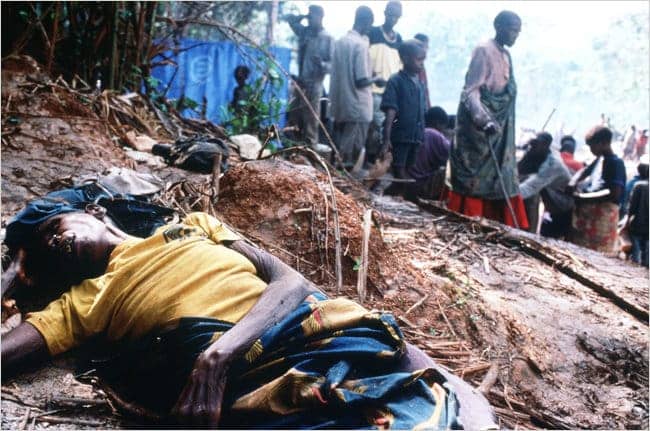
This court is Spain�s Audiencia Nacional (National Court) which, pursuant to the principle of universal justice, possesses full jurisdiction to prosecute this kind of crime. It is by virtue of this principle, for example, that the arrest of Augusto Pinochet was possible in London and that today the Interpol and the SIRENE network are acting on the 40 arrest warrants cited above. Let us also remember that the four Spanish Marist clergymen who were accompanying the Hutu refugees and who had previously condemned internationally this huge slaughter were murdered by the RPF in the Nyamirangwe refugee camp in eastern Congo on Oct. 31, 1996.
In my opinion, there are various other errors in Jean-Philippe R�my�s article. R�my is much too quick to endorse some interpretations of the motives behind the crimes that hardly match the facts and are at this point almost untenable today. The most outrageous interpretation states that �the Rwandan intervention sought to prevent the refugees from coming together and, led by the �genocidaires,� rising in revolt to attack Rwanda from their refugee camps at the other side of the border, in the former Zaire. The approach was to empty the entire region. Part of the refugees will return to Rwanda, another will be killed at the camps, others will flee across Zaire where they will be hunted down.�
Could a huge mass of human beings consisting mostly of malnourished women, elderly people and children come together and rise in revolt? Besides, shouldn�t there be a mention of the other goals the RPF pursued with that slaughter � those that many honest analysts actually rank as the main goals? That is,
? controlling the mineral fields in eastern Zaire, exactly where the �annoying� refugee camps were located; putting an end to the presence and diverting the attention of the international community related to those fields, which could derail the plans these criminals and their powerful allies had in Zaire;
? �correcting� as far as possible the demographic imbalance between Hutu and Tutsi which the RPF viewed as excessive, while at the same time averting a big international scandal under the guise of �hunting down the genocidaires�;
? having a submissive and controlled Hutu population, devoid of intellectuals or leaders, repopulate some of the regions in Rwanda that the RPF �operations� had left so deserted that they could potentially become a permanent black mark for the RPF that the international community would readily decry.
Unfortunately, the U.N.�s 14-year silence has had tragic consequences. Thousands of conniving silences have allowed those criminals basking in the bogus moral halo of having allegedly halted the genocide by Hutu extremists in the spring of 1994 to continue causing, with utter impunity, tremendous suffering in Rwanda and Congo!
But the report, whose recent leak has spurred widespread international coverage, could be the beginning of the end for Paul Kagame, who at the time was already head of the RPF and is now also president of Rwanda. True, up to now, it has only been a leak.
But the facts of the report are now in the public domain, above and beyond the sequel of pressures, blackmails and deals about to take place from now on, hushed and behind the scenes of the high political and economic circles of our times, primarily with the purpose of eliminating the word �genocide� from the text. Indeed, at long last more and more analyses are appearing about this situation which some of us had already been analyzing 14 years ago as the incidents themselves were occurring.
Already as early as October 1996 and more pointedly from February 1997 onwards, we condemned the massive massacres of Rwandan and Congolese Hutu being carried out in true genocidal manner, the cremation of tens of thousands of bodies, the extermination through starvation etc. Our documents were signed by some 20 Nobel laureates, as well as by heads of the political groups of the European Parliament.
How could our world leaders not possibly have known of crimes on such scale? How could Spain�s Ministry of Foreign Affairs not have known either?
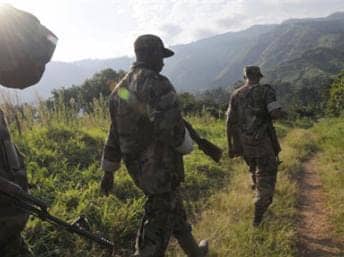
We ourselves had those documents handed to Bill Clinton and others truly and ultimately responsible for this genocide. In addition to the diplomatic channels, Elie Wiesel, survivor of the Nazi extermination camps and Nobel Peace laureate, promised our colleague Adolfo P�rez Esquivel, a Nobel Peace laureate as well, to personally hand them to Bill Clinton in the meeting he was to have with the president shortly thereafter.
On the other hand, on Feb. 24, 1997, after my 42-day fast at the European Parliament in Brussels, I personally handed these documents to Abel Matutes1, native of Ibiza, who was Spain�s minister of foreign affairs at the time. Inocencio Arias, spokesman for the Ministry of Foreign Affairs, was with him at that meeting. I, in turn, was accompanied by Merc� Amer, Socialist regional/autonomic secretary of Mallorca.
Spanish state television TVE vetoed the news of this meeting, where documents of such serious nature and signed by such prominent people were being presented to the minister. The Brussels correspondent of TVE came over to me and told me how badly she personally felt: She had been following our fast and admired what we were doing together with Commissioner Emma Bonino, but she added that the news had unfortunately been vetoed and that, much to her regret, she wouldn�t be able to film.2
As it was, heightened tension reigned at the meeting due to the assassination of three Spanish volunteers of M�dicos del Mundo merely a few days before. We now know that the RPF perpetrated this crime, even though the strong propaganda machine of the international godfathers of this criminal organization had managed within hours to get the world media to attribute this triple murder to extremist Hutu once again.
Indeed, it�s so true that the U.N. report doesn�t make any major revelations that even now, after its leak, I will hardly be making any changes in the second edition of my book, ��frica, la madre ultrajada� (�Africa, The Violated Mother�). The news is not the fact that the RPF perpetrated a genocide on such a large scale.3
In this genocide, the count of ethnic Hutu, both Rwandan and Congolese, violently eliminated by the RPF since 1990 should be estimated at hundreds of thousands at least. The scale of this genocide is even much larger if we consider the millions of victims, not only Hutu but also from other Bantu ethnic groups in Congo � or simply �not Hima-Tutsi,� as the racist RPF elite calls them.
They died not only through violent force but primarily due to starvation and other reasons related to the aggressions inflicted on Zaire/Congo by Rwanda, Uganda and Burundi in their genocidal attempt to establish in that region an empire controlled by Hima-Tutsi clans.
The High Commissioner for Human Rights has merely investigated the tip of the iceberg of this genocide, since it has looked at merely 600 violent incidents only in Congo and only from 1993 to 2003. It is a genocide in which already as early as 1997 � that is, one year before the second and deadliest invasion � the report of the U.N. team headed by the Chilean Roberto Garret�n documented the investigation of around 40 locations in Congo and put the death count at up to 100,000.
A hint of the scale of this genocide can be found in a report by the International Rescue Committee which estimates 5.4 million victims in Congo until 1997 � in excess of the normal mortality figures � due to causes related to the aggressions staged there.
That�s not the news. The real news is something else: namely, that in a move that breaks the code of silence that has reigned within the U.N. for too many years, the High Commissioner for Human Rights reveals that the U.N. Security Council and U.N. Secretary-General Ban Ki-moon and Kofi Annan before him � the same parties who less than a year ago accused some of us of financing the genocidaires � have actually spent more than a decade covering up the continuous genocide carried out by the RPF from Oct. 1, 1990, until today, which probably constitutes the largest one since the U.N. was founded!
Jean-Philippe R�my�s article cited above is entitled, precisely, �A Long Set of Obstacles to Justice and Truth.� As Glen Ford well said in the analysis he wrote shortly after the leak of the report, �Rwandan Crisis Could Expose U.S. Role in Congo Genocide,�4 we are facing �a political crisis that threatens to disrupt Washington�s plans to dominate the continent.
�At stake is not only the reputation of Rwandan President Paul Kagame, an alumnus of the U.S. Army Command and General Staff College in Fort Leavenworth, Kansas, but the larger American strategy for militarization of Africa and exploitation of her riches. �
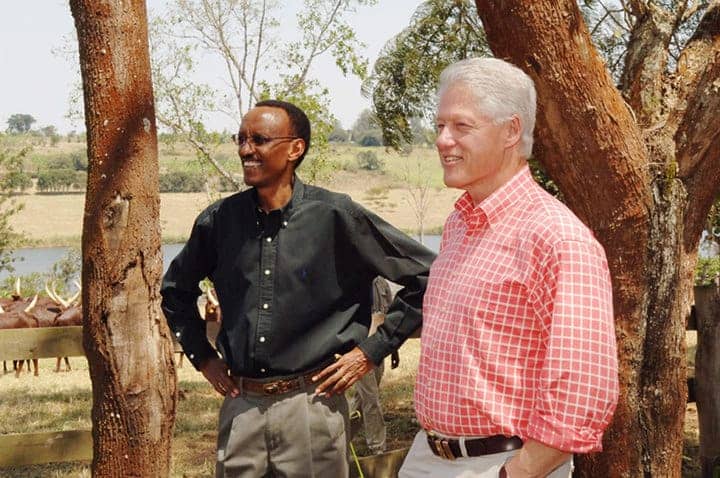
�Carnage on such a scale could not have occurred were it not for the connivance of the United States, which has nurtured Kagame at every juncture. �
�The leaked U.N. report cannot be put back in the bottle. Kagame, who labels all critics �genocidaires� or apologists for genocide, is exposed as �the greatest mass killer on the face of the earth, today,� as described by Edward S. Herman, co-author of �The Politics of Genocide.� Kagame�s mentors and funders in the U.S. government, who aided and abetted his genocide in Congo, must be held equally accountable � if not more so, since United States corporations derive the greatest benefit from Congo�s blood minerals, and the U.S. military gains the most advantage from Rwandan and Ugandan services as mercenaries at America�s beck and call in Africa.�
The Rwandan government has reacted by making virulent threats, and the High Commissioner has postponed the report�s release until Oct. 1. The following weeks will be marked by a fierce struggle to delete the word �genocide� from the report, since this classification would require the immediate intervention of the international community.
The U.S. government must be held equally accountable if not more so, since United States corporations derive the greatest benefit from Congo�s blood minerals, and the U.S. military gains the most advantage from Rwandan and Ugandan services as mercenaries at America�s beck and call in Africa. � Glen Ford, Black Agenda Report
Nevertheless, something new is happening in this great conflict as a significant movement of pieces appears to be taking place on the board. Another fact also evidences this: The important Gersony report5, up until recently eerily unavailable, suddenly surfaced this past Sept. 7. It is another honest report, done as early as 1994, but in this case by the U.N. High Commissioner for Refugees.
The report has remained suppressed since then and high-ranked U.N. officials even denied it had ever existed. It documents the systematic ethnic cleansing of Hutu, genocidal in nature, carried out by the RPF in the Rwandan interior6 during 1994.
The investigative team led by Gersony examined the assassination of some 30,000 Hutu by the RPF, but only looked at crimes perpetrated during a two-month period and in merely three prefectures. However, similar to the recent report by the U.N. High Commissioner for Human Rights, �[T]he massacres condemned in the Gersony report represented only the visible tip of a monumental iceberg consisting of hundreds of thousands of victims butchered by RPF troops since October 1, 1990 in the areas occupied by the military.�
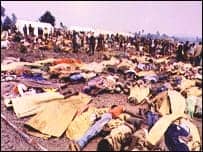
Former Rwandan Foreign Minister Jean-Marie Vianney Ndagijimana makes this statement in his excellent book recently published, �Paul Kagame a sacrifi� les tutsi�7 (�Paul Kagame has sacrificed the Tutsi�). Upon receiving a photocopy of the Gersony report, I asked him to confirm its authenticity, which he did, although he added that an annex is missing.
Jean-Marie Vianney Ndagijimana, of mixed Hutu-Tutsi descent, had testified in the lawsuit we filed at the Spanish National Court and is now the person responsible in France for the Intra-Rwandan Dialogue we have been sponsoring since 2004. This extraordinary Rwandan witnessed first hand the wheeling and dealing behind the suppression of the compromising report.
The entire horse-trading took place in the U.S. Department of State in early October 1994 between Hutu Rwandan President Pasteur Bizimungu from the RPF � albeit always under the watchful eye of �consultant� Charles Muligande � and Assistant Secretary of State for African Affairs George Moose. Pasteur Bizimungu had actually gone to argue that �a �post- genocide� was going on, while at the same time, the RPF military was getting away with massacring entire groups of people without the international community expressing any disapproval.�
Seeing George Moose�s excessively understanding reaction to the Rwandan president�s case, Jean-Marie Vianney Ndagijimana inferred what was going to happen with the Gersony report, as it indeed turned out: That meeting �sealed the fate of the Gersony report once and for all.�
Vianney Ndagijimana resigned from his post as minister a few weeks later �in order not to be an accomplice of the ethnic cleansing practises� and went into exile �to bear witness of this silent genocide, as disgraceful and reprehensible as the Tutsi genocide, and to publicly condemn it worldwide.�
Others didn�t act with such ethics and integrity: Kofi Annan, U.N. Under-Secretary-General for Peacekeeping at the time; Shahryar Khan, U.N. Secretary-General�s Special Representative to Rwanda; Timothy Wirth, Undersecretary for Global Affairs, including matters of human rights; Brian Atwood, director for Africa of USAID, which had financed the investigation aimed at determining whether the interior of Rwanda was equipped for the return of Hutu refugees.
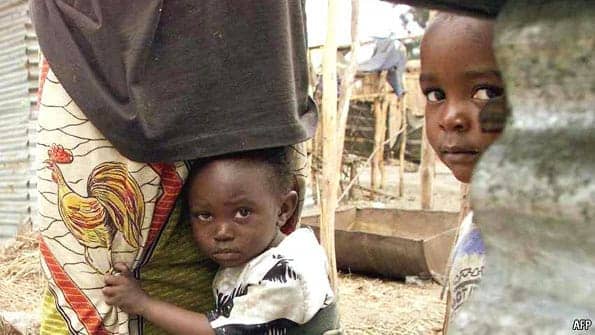
Prior to the meeting of the Rwandan president with the assistant secretary of state, all individuals cited above had met several times with Jean-Marie Vianney Ndagijimana, on one occasion with Robert Gersony present. The former minister described that some of them had spoken very harshly to the Rwandan president. But the fact is that the Gersony report was suppressed and none of the people mentioned above ever condemned the terrible ethnic cleansing that had taken place nor the cover-up of such an important piece of evidence.
Kofi Annan showed the report to Jean-Marie Vianney Ndagijimana and even let him read it but refused to give him a copy. Thus, already back then the future U.N. Secretary-General knew very well that the theory of a double genocide was not wrong. And it is certainly far from being a form of negationism and hence a crime, as Ram�n Lobo has dared state in the Spanish daily El Pa�s.
Good heavens! � daring to label as criminals Judge Fernando Andreu, who accuses Kagame and 40 top officials from the RPF of committing crimes of genocide, and now High Commissioner Navi Pillay, who signs the recent U.N. report!
Yet this journalist is not alone. Many are the know-it-all analysts, who have no qualms writing about any matter of the moment, even about conflicts as serious and complex as this one � or who, rather, have only listened to the powerful rhetoric of the Manichean official doctrine that resolutely maintains that the story of the genocide is one of genocidaires on the one side and noble liberators on the other.
On the contrary, Kofi Annan and current Secretary-General Ban Ki-moon know that the accusations made by Judge Fernando Andreu Merelles are well-founded: �crimes of genocide, crimes against humanity, crimes against individuals and property protected in the event of armed conflict, membership in a terrorist organization, terrorist acts, pillage of natural resources and the assassination of nine Spanish nationals.�
As we suspected and made public at the time, Ban Ki-moon�s efforts to bill genocidaire Paul Kagame as the superhero of the struggle against hunger and other evils plaguing our world have possibly infuriated and mobilized the group of people with integrity still to be found at that big organization which is the U.N. Let�s just hope that Navi Pillay doesn�t end up sacked for the same reasons for which others were ousted in former times: U.N. Secretary-General Boutros Boutros Ghali, ICTR (International Criminal Tribunal for Rwanda) prosecutor Carla del Ponte, among many others.
Jean-Marie Vianney Ndagijimana spent years wondering why the secretary-general had decided to embargo the Gersony report. In a meeting at the headquarters of the Tribunal of The Hague in November 2002, Carla del Ponte confirmed to him what he had been suspecting all along. The former minister writes in his book:
�[W]ithout avoiding [the subject], she acknowledged that this report was under the jurisdiction of the ICTR and that it should have ordinarily been included in the dossier of crimes perpetrated in Rwanda in 1994 by one of the warring parties. Unfortunately, she added, all efforts to obtain the Gersony report as well as various other U.N. reports providing evidence of the crimes committed by the RPF had proved to no avail up until then. She continued: �I sent an official request to the U.N. High Commissioner for Human Rights, Ms Ogata,8 asking her for that report, but I ran into a wall. �
�Carla del Ponte admitted that, in despair, she also requested that Robert Gersony be heard by the ICTR prosecutor � again to no avail. Once again the U.S. government expressed its opposition, ruling it inadmissible! As we can see, Paul Kagame enjoys the protection of one or more of the superpowers which have a veto right [in the U.N. Security Council] and are able to dictate its agenda at the heart of the U.N. organizations. You don�t need to be a wizard to know that the Clinton administration, surely embarrassed and ridden with guilt for having opposed the deployment of U.N. troops to stop the genocide, has preferred focusing on the bottom line of the massacres of hundreds of thousands of innocent Hutu civilians.�9
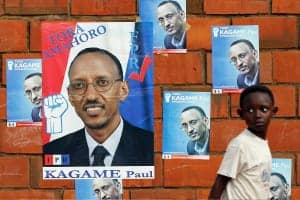
Let�s hope that the time has come; let us hope that those who pull the strings realize that sustaining this sham, this disgraceful impunity, is untenable at this point. We firmly believe that those of us outside the U.N. should help enable those upright individuals within the organization to keep it from serving the interests of the Trilateral Commission10 and of other powerful and elitist groups instead of serving the interests of peoples. In this respect, we share the views expressed by Adolfo P�rez Esquivel and Mallorquinian Sen. Pere Sampol, who was vice-president of the government of the Balearic Islands and knows well the mazes of political intrigue.
At any rate, what I stated in the preface of my book might begin to prove true: �When this monumental tragedy gets the coverage it deserves in the big media, it will become one of the most embarrassing chapters in the annals of the United Nations, of the entire Western world, in general, and in particular, of Jos� Lu�s Rodr�guez Zapatero�s Socialist government.�
Spain�s prime minister, however, may still be able to change fate. He just needs to continue on the path he started by not meeting with Paul Kagame in Madrid; he just needs to refuse to co-chair together with this criminal the Advocacy Group of the Millenium Development Goals. He just needs to cooperate with Spain�s Audiencia Nacional on the legal proceedings against the 40 top officials of the RPF. He just needs to meet � at long last � with the families of the nine Spanish victims.
Juan Carrera of the International Forum for the Truth and Justice in the Great Lakes Region, a Nobel Prize nominee, has campaigned for years against impunity there. In 1996, he walked over 600 miles to Brussels and a year later went on a 42-day hunger strike in front of the European Union Council headquarters to persuade the EU to stop the atrocities in the DR Congo. With Spanish Sen. Sampol he successfully pushed for a lawsuit in Spain against members of the Rwandan government on behalf of Spanish victims who died in Rwanda after the genocide. The lawsuit resulted in the indictments of 40 of Rwanda�s current top and former military officials for genocide crimes and other human rights abuses. He can be reached by emailing [email protected].
- He is currently one of the 12 Spanish members of the Trilateral Commission.
- The media, however, were allowed the photo-op de rigueur of that meeting. See Chapter 2 of www.pangea.org/olivar.
- In the article mentioned above, Jean-Philippe R�my comments on the statements made by one of the initiators of the report: �[T]here have been too many cases of massacres which have been concealed to the eyes of outside witnesses � These �concealed elements� as well as those �things never said should have been brought to light a long time ago,� the same source said. �It was well-known that this was a huge thing,� the person added.�
- It can be found in �Unearthed �Gersony Report� the U.N. said it never existed� at The Proxy Lake.
- The RPF first carried out the ethnic cleansing in the areas they were seizing in the spring of 1994, the same spring when the Hutu extremists were carrying out their own genocide of the Tutsi in the areas under their control. Primarily, however, it was the cleansing carried out by the RPF after its full-fledged victory on July 18.
- Editorial La Pagaie, pages 134-141.
- As I pointed out in my book, Sadako Ogata is also a member of the Trilateral Commission.
- Pages 140-141.
- Almost everyone who has played a key political role in the Rwandan conflict has been or still is a member of the Trilateral Commission and/or has attended or attends the meetings of the Bilderberg Group: Bill Clinton, Tony Blair, Margaret Thatcher, Kofi Annan, Madeleine Albright, Bill Richardson, Sadako Ogata, Susan Rice, Raymond Chr�tien, Jean Chr�tien, Hillary Clinton or Bernard Kouchner. This list does not take into account the higher number of members of the Foreign Relations Council or of the Royal Institute of International Affairs.
Black Agenda Report, translated for Rebeli�n by Mariola and Jes�s Mar�a Garc�a Pedrajas.
September 21, 2010 3 Comments
Rwandan Security minister Fazil Harelimana tables end of presidential term limits
Kigali – Within two months, two Members of the Lower Chamber will table a bill seeking an amendment to the 2003 Constitution to remove terms limits to allow President Kagame to stay in office, RNA can exclusively reveal.
A small political party Ideal Democratic Party (PDI) of Interior Minister Sheikh Musa Fazil Harelimana has instructed its two Deputes in the Lower Chamber of Parliament to come up with a bill to amend Article 101 in the Constitution.
The Article reads: �The President of the Republic is elected for a term of seven years renewable only once. Under no circumstances shall a person hold the office of President of Republic for more than two terms.�
Should PDI Deputes MUKAMA Abbas and HAMIDOU Omar get their way, President Kagame � who has repeatedly indicated that he does not intend to stay in power, will have the leeway to contest as many seven-year terms as he wishes.
The proposal to amend this Article is part of recommendation adopted by a PDI congress which met Saturday. Up 100 party delegates converged in Kigali apparently to review how the just concluded presidential poll was conducted � among other issues.
The delegate who raised the idea, whom RNA has not readily established where he came from, said the people down in the villages are �crying� that they will not accept anybody else to be their president apart from Paul Kagame.
Immediately, there was unanimous applause as all the members responded in unison to the proposal and it was immediately adopted as the first among about five recommendations from the congress.
The recommendation also instructs the two PDI Deputes to work on a constitutional amendment bill to have the term limits Article scrapped.
Party leader Sheikh Harelimana told reporters on the sidelines of the congress that PDI was going to push for a referendum on term limits.
�There are articles in the constitution which are a burden to Rwandans,� he said, adding that it was the constitutional right of the people of Rwanda to change anything they feel they don�t want.
Sheikh Harelimana was the vice president of the electoral commission during the 2003 presidential polls � in which President Kagame scooped some 95.6 percent of the vote. Sheikh Harelimana was eventually appointed Governor of the Western Province.
In the March 2006 cabinet shuffle, Sheikh Harelimana was brought into cabinet as Internal Security Minister as party rival Mr. Andre Bumaya was thrown out � and consequently fled the country in March this year.
Prior to the 2003 Constitution which outlawed religious links for parties, the �I� in PDI stood for �Islamic�, but that had to be changed to �Ideal�.
PDI has been among about six small parties which have continuously thrown their weight in coalition behind the dominant ruling RPF party. For the 2008 Parliamentary polls, PDI had three candidates on the 80-member coalition list, but among the 43 who went to the Lower Chamber, was only two PDI Deputes.
[ARI-RNA]
September 20, 2010 1 Comment
African Union to back Rwanda to protest UN �Genocide� report in New York
Kigali – The African Union is tipped to use the 65th Session of the United Nations General Assembly to force amendments on the report that accuses Rwanda of alleged Genocide in DR Congo.
The session that gets under way on Monday in New York has been rocked by the leaking of the report linking Rwanda troops to genocide in the Democratic Republic of Congo.
The UN was left with egg on its face after the contents of the 600-page draft report was leaked, prompting the secretary-general Ban Ki-moon to fly to Rwanda to ease tensions.
Former and current diplomats told the Kenyan newspaper �Sunday Nation� that the African Union will seek changes to the document as a show of solidarity with Rwanda which has become a major player on the continent.
Another former ambassador and now university don, Prof Frank Matanga, says the leak has exposed the UN and left it with no option but to cause the amendments as demanded by Rwanda.
The recognition of Rwanda�s growing importance in African affairs, Prof Kikaya added, should provide a good starting point to mobilise the AU block to demand tighter structures to forestall any future leaks.
�The burden is on Rwanda�s diplomatic corps to lobby the African caucus to give its position on this matter,� he told the Kenyan daily.
Rwanda�s growing importance in the continent since the genocide in 1994 can be seen in its peace efforts in the region.
It currently has 3300 peacekeeping force and 86 police serving with a joint UN and African Union force (Unamid) in the troubled western Sudanese region of Darfur. It is led by Rwandan Lt Gen Patrick Nyamyumba.
Another 256 troops serve with the UN Mission in Sudan (Unmis), which is supporting the implementation of a peace deal between north and south.
�Rwanda was the first country to send troops to a very treacherous place to monitor implementation of the Comprehensive Peace Agreement. It therefore pioneered the African-based force,� Prof Kikaya pointed out.
Instead of bashing Rwanda, the UN should be thanking the country for evolving African-based peace keeping in the continent, added Prof Kikaya.
The fact that the report also names Uganda, Zimbabwe, Angola and Burundi, it creates sympathy among other African leaders to fall behind their colleagues, according to diplomats.
President Kagame will also meet with UN Secretary General Ban ki-moon and other top UN officials as part of Rwanda�s offensive against the report due to be released on October 01.
[ARI-RNA]
September 20, 2010 1 Comment
Rwandan President Kagame Lashes Out at UN over Report on Genocide against Hutus
Rwandan president Paul Kagame has again lashed out at the United Nations, for a leaked UN report which suggested Rwandan soldiers were guilty of mass killings and rape in the Democratic Republic of Congo. Making a speech in London, Mr. Kagame suggested the report’s authors may have deliberately given a false account. As the dispute worsens, the Rwandan leader has threatened to withdraw Rwandan peacekeepers from Sudan. VOA’s Henry Ridgwell reports from London.
September 18, 2010 2 Comments

